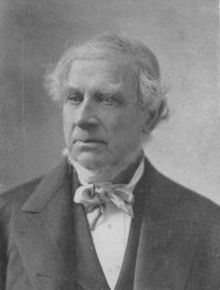Get Today in Masonic History into your Inbox. Sign up today for one of our email lists!
Need an article for your Trestleboard/Newsletter see our Use Policy
The Anti-Masonic Party

founders of the
Anti-Masonic Party
Today in Masonic History we discuss The Anti-Masonic Party.
The Anti-Masonic Party, sometimes Movement, was the first successful third party in American history.
The history of the Anti-Masonic Party starts with the Morgan Affair which occurred in Batavia, New York. It was alleged Freemasons from the local lodge killed an individual named Morgan who had become angry with the lodge and threatened to publish all of the "secrets" of Freemasonry. Morgan disappeared from the town and it was claimed lodge members drowned him in the Niagara River. No sign of Morgan was ever found.
The idea a group of Freemasons killed someone who spoke out against them resonated with people. It was during this time with the westward movement of settlers and the industrial revolution, many people started to become distrustful of government and long standing institutions like the Freemasons. There was also a religious revival going on, a period known as the Second Great Awakening. The area of western New York was in what was called the Burned-over District, a phrase coined to indicate all of the "fuel" (people to convert to new religions) had been "burned" (converted).
Initially the Anti-Masonic movement was confined to western New York in the Burned-over District. Before long it began to spread, less for the original reasons which occurred in Batavia with the Morgan Affair, and more because of Andrew Jackson. Anti-Jacksonians needed a cause to rally people around, the fact Jackson was a prominent Freemason and often spoke about the fraternity gave the failing National Republican party what they needed. The Anti-Masonic movement became less about stopping Freemasonry and more about defeating Jacksonian Democrats.
Before long the Anti-Masonic Party created some innovations unheard of at the time in American politics. One innovation was party newspapers, one of those papers starting in 1829 was the Albany Journal in it the paper attacked Martin Van Buren. In one paragraph the words "dangerous," "demagogue," "corrupt," "degrade," "pervert," "prostitute," "debauch" and "cursed" were found. Another innovation was Nominating Conventions.
The first Nominating Convention in the history of the United States was held by the Anti-Masonic Party for the 1832 presidential elections. The party nominated William Wirt who, by his own admission, had made it through to his Fellowcraft degree. There is some evidence, despite Wirt's denial, he did receive his Master Mason degree. The evidence is questionable though and he probably did not receive it. Despite Wirt's party affiliation he did defend Freemasonry at the Anti-Masonic Convention where he was nominated. Wirt stated "I was myself initiated into the mysteries of Freemasonry. I never took the Master's degree, but it proceeded from no suspicion on my part that there was anything criminal in the institution, or anything that placed its members in the slightest degree in collision with their allegiance to their country and its laws. I have thought and repeatedly said that I considered Masonry as having nothing to do with politics, and nothing has surprised me more than to see it blown into consequence. . . ."
Wirt carried just over 7% of the popular vote in the National Election as well as all of the electoral college delegates from Vermont.
Overall the Anti-Masonic Party had little success. They elected a Governor in Pennsylvania as well as a Governor, Lieutenant Governor and other high level elected positions in Vermont. In some states they did get members into the state Legislatures, although never enough to make any real changes. They never were able to get an Anti-Masonic Party member into the United States Congress.
In 1838, the Anti-Masonic Party held it's third and final nominating convention. At the convention they nominated William Henry Harrison, who was later nominated by the Whigs, the same party where most Anti-Masonic Party members had already migrated. When this happened the Anti-Masonic Party did not nominate another candidate and the party ended after only 10 years.
In 1872 there was a resurgence of the Anti-Masonic Party, this time it was a religious base fueling the party. The second Anti-Masonic Party ended in 1888.
This article provided by Brother Eric C. Steele.

